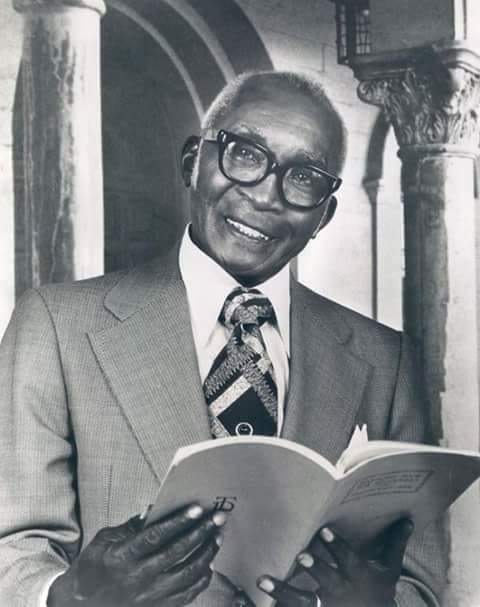Jester Joseph Hairston (July 9, 1901 – January 18, 2000) was an American composer, songwriter, arranger, choral conductor, and actor. He was regarded as a leading expert on African-American spirituals and choral music. His notable compositions include “Amen,” a gospel-tinged theme from the film Lilies of the Field and a 1963 hit for The Impressions, and the Christmas song “Mary’s Boy Child”.
Hairston was born in Belews Creek, a rural community on the border of Stokes, Forsyth, Rockingham and Guilford counties in North Carolina. His grandparents had been slaves. At an early age he and his family moved to Homestead, Pennsylvania, just outside of Pittsburgh, where he graduated from high school in 1919. Hairston, who gave up studies at Massachusetts Agriculture College in the 1920s, went on to graduate from Tufts University in 1928 and studied music at the Juilliard School. Hairston pledged Kappa Alpha Psi (Chi Chapter) in 1925. He worked as a choir conductor in the early stages of his career. His work with choirs on Broadway eventually led to his singing and acting in plays, films, radio programs, and television shows.
Helped by benefactor Anna Laura Kidder who saw his potential, Hairston graduated from Tufts University, near Boston, Mass. in 1929. He was one of the first black students admitted to Tufts.
He sang with the Hall Johnson Choir in Harlem for a time but was nearly fired from the all black choir because he had difficulty with the rural dialects that were used in some of the songs. He had to shed his Boston accent and relearn the country speech of his parents and grandparents. (Johnson had reportedly told him, “We’re singing ain’t and cain’t and you’re singing shahn’t and cahn’t and they don’t mix in a spiritual.”) The Hall Johnson Choir performed in many Broadway shows including Green Pastures. In 1936, they were asked to go to Hollywood to sing for the film,Green Pastures. At that time, a Russian composer, Dimitri Tiomkin, heard Jester and invited him to collaborate with him. This led to a thirty-year collaboration during which time Jester arranged and collected music for the movies. He also wrote and arranged spirituals for Hollywood films as well as for high school and college choirs around the country.
Hairston wrote the song “Mary’s Boy Child” in 1956. He also wrote the song “Amen”, which he dubbed for the Sidney Poitier film Lilies of the Field (1963), and arranged traditional Negro spirituals. Most of Hairston’s film work was in the field of composing, arranging, and choral conducting. Hairston also acted in over 20 films, mostly in small roles, some of which were uncredited. Among the films he appeared in were bit parts in some of the early Tarzan movies, St. Louis Blues (1958), The Alamo (1960), To Kill a Mockingbird (1962), In the Heat of the Night (1967), Lady Sings the Blues (1972), I’m Gonna Git You Sucka (1988) and Being John Malkovich (1999).
In 1961, the US State Department appointed Jester Hairston as Goodwill Ambassador. He traveled all over the world teaching and performing the folk music of the slaves. No matter where Jester performed in the US, he checked the phone book for Hairstons and was responsible for reuniting people on his family tree, both black and white. He composed more than 300 spirituals. All of his research and work has been documented for history. He was the recipient of four honorary doctorates, including an honorary doctorate from The University of Massachusetts in 1972, and another in music from Tufts in 1977.
Hairston appeared on The Amos ‘n’ Andy Show. He had been in the radio program that was the basis for the TV show. He also played the role of Wildcat (1974–1975) on the show That’s My Mama. In his senior years he appeared in the show Amen as Rolly Forbes (1986–1991).[6] His last television appearance was in 1993 on an episode of Family Matters, a sitcom. Hairston also played the role of “King Moses” on radio for the Humphrey Bogart and Lauren Bacall show Bold Venture.
In his later years, Hairston served as a cultural ambassador for American music, traveling to numerous countries with choral groups that he had assembled. In 1985 he took the Jester Hairston Chorale, a multi-racial group, to sing in the People’s Republic of China, at a time when foreign visitors were still quite rare in that country.
Hairston died in Los Angeles of natural causes in 2000 at age 98. Born in 1901, Hairston’s life spanned each year of the 20th century. For his contribution to the television industry, Hairston has a star on the Hollywood Walk of Fame located at 6201 Hollywood Blvd. He is interred at Inglewood Park Cemetery, Inglewood, California.

